Peter MALONE
Saturday, 09 October 2021 13:00
Men in Black
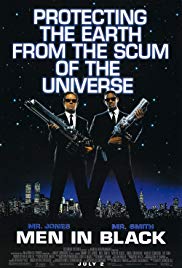
MEN IN BLACK
US, 1997, 98 minutes, Colour.
Tommy Lee Jones, Will Smith, Linda Fiorentino, Vincent D' Onofrio, Rip Torn, Tony Shalhoub, Siobhan Fallon, Mike Nussbaum.
Directed by Barry Sonnenfeld.
The film is worth commenting on simply because it has been the most popular film in the US for 1997, making well over $200,000,000 at the home box office. While it has plenty of special effects for the aliens, their transformations and their space vehicles, like Mars Attacks, this is a spoof of the Hollywood alien movies. It won an Oscar for best make up.
Solemn Tommy Lee Jones and flip Will Smith are the men in black, an organisation whose mission is `to protect the world from the scum of the universe'! , Lee Jones gives a perfectly timed comic deadpan performance and will Smith is his cheeky self, at the time of making the And some of the aliens are really hostile, though others (monitored daily by TV cameras) have taken the form of Sylvester Stallone and Newt Gingrich.
Running time is rather brief, so it's an amusing and wry comment on our space obsessions. There were two sequels and an updating in 2019 with Men In Black International, which was not a great success at the box office.
1. A popular film of its time? Space and aliens? Aliens in human society? The Men in Black and their mission to keep the world safe and control the aliens?
2. New York City, the streets, ordinary life, the shops, the aliens running the businesses? The bureau and its interiors, its equipment? Surveillance of the aliens? The musical score?
3. The design of the aliens, the touch of the monsters, the ordinary creatures, the smaller creatures within the humans? For fright? Menace? For comic purposes?
4. The opening, K and his work, Tommy Lee Jones, deadpan personality? The pursuit, the alien, the police, taking over, erasing the memories? The fellow agent, getting tired, taking his memories and his retirement?
5. Will Smith as the police officer, pursuit, abilities, erratic behaviour of the alien, the encounter with K, the jeweller’s shop, the Rolexes, the cash and weapons? The aliens? The amazement of the officer?
6. The aliens and the crash landing, Edgar going to look, his boorish his wife, his being taken over, monstrous look and behaviour? The dismay of his wife, the being interviewed by the agents, their transforming of memories into positive memories? Edgar, his truck, going into the city, his mission? His relentless pursuit? The confrontation is, impersonations, in the restaurant, killing the two men, their being taken to the morgue, examined, his presence in the morgue, threatening Laurel, climbing the building, his being confronted by the agents?
7. Jay, unwilling, mystified, going to the bureau, the range of tests and his ingenuity, the other straight up-and-down agents, Said and his interest? Kay and his observing? The choice? The suit, the gun? The work of the bureau, the range of officials and their equipment, Jay and his accident and the ball going round destructively?
8. Laurel, her work, autopsies, the visit of the agents? Removing her memories? Edgar, holding her hostage, Jane not picking up the messages? Her being taken by Edgar? Tough heroine in distress?
9. The ruler, his small human form, his being warned? His death? The small creature within him? The message about Orion’s belt in the galaxy? Observing space? The realisation of the cat called Orion? The pursuit of the object?
10. Kay, looking at the image of his wife, wanting to finish, getting Jay to eliminate his memories?
11. The underlying serious stories that tradition about aliens? The spoof and comedy, both deadpan and wisecracks and in action?
Published in Movie Reviews
Published in
Movie Reviews
Saturday, 09 October 2021 13:00
Men in Black 2
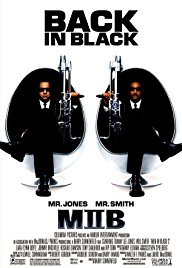
MEN IN BLACK II
US, 2002, 88 minutes, Colour.
Tommy Lee Jones, Will Smith, Rip Torn, Lara Flynn Boyle, Johnny Knoxville, Rosario Dawson, Tony Shalhoub, Patrick Warburton.
Directed by Barry Sonnenfeld.
Five years ago, a logo with the mysterious letters MIB kept tantalising filmgoers until Men in Black hit the big screen. It proved to be one of the most popular films of 1997. It's hard to work out why Men in Black touched a chord in audiences worldwide. Now we have the sequel and a chance to think again.
The director, Barry Sonnenfeld, made the two Addams Family films as well as Wild, Wild West. He knows comic strip action comedy very well. Perhaps that's it, the blend of action and comedy. He himself said that he saw Men in Black as a small buddy movie. Yes, Tommy Lee Jones as special agent J and Will Smith as special agent K worked together so well that we enjoyed their company. Well, they are back again, good friends again, sometimes sparring, but always helping each other out.
Maybe it's all the aliens who have migrated to planet earth, monstrous-looking aliens that are a special effects buff's delight but who eventually disguise themselves like you and me. This time, a gruesome creature who is traversing space and time to find a special light to conquer the world, controls her tentacles (most of the time) be assuming the form of glamorous Lara Flynn Boyle. She is a sombre, humourless monster although some of her henchman, especially one with two heads, give us a laugh.
The plot is simple, J and K have to rid the universe of her by midnight, otherwise, who knows...?
Men in Black is an OK, brief, fairly modest show that relies on the chemistry between its stars, on the happy go lucky charm of Will Smith and on the oddball monsters. That really does not explain hundreds of millions of dollars box office, but it might explain why youngsters and family audiences have it at the top of their movie list at the moment.
1. The popularity of the original film? Science-fiction? The agency and the agents? The comic dialogue? Spoof?
2. New York City, the agency and the interiors and the equipment, the streets, the shops, the open countryside, the spacecraft and landings? The musical score?
3. The make-up, the creation of the creatures? The versatility? Changes?
4. Jay, Will Smith and his presence, comic touches, pursuing the creatures? Confrontations? The discussions with Zed, the situation, the investigation in the shop, Laura as witness, the attraction? Zed and the command to bring Kay back? Frank the dog, talking and wisecracks, companion?
5. Kay, working in the post, memories gone, the irony of all the creatures working in the post office? Jay, challenging him? His having the information about the deadline? His going to the agency? The need to find the new relies? The visit to Jeebs, the shop, the machine? The process, swirling the liquid? The eventual return of memory, going to the agency, the suits and weapons?
6. Serleena, her coming to earth, seeing the Victoria’s Secret ad, transformation, devouring humans, the glamour, the confrontation with Scrad/ Charlie, Johnny Knoxville style, the two personifications and their interactions? The mission, control of Earth, her promises to the various aliens for power?
7. The introduction, Peter Graves and the spoof television program? It is being introduced into the drama of the galactic struggle?
8. The action sequences, fighting the aliens? Jay and Kay and their resuming their work together?
9. Kay, memories of Selena, the buildup to the confrontation?
10. Serleena and her encounter with Z, revenge? Malice, the confrontation with Kay?
11. The time limit, the desperate moves, time running out, the achievement? Serleena destroyed?
12. And audiences having to wait for a decade before the next sequel?
Published in Movie Reviews
Published in
Movie Reviews
Saturday, 09 October 2021 13:00
Careful What You Wish For
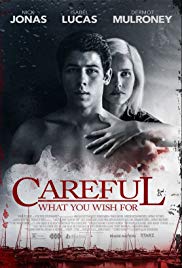
CAREFUL WHAT YOU WISH FOR
US, 2015, 91 minutes, Colour.
Nick Jonas, Isabel Lucas, Dermot Mulroney, Paul Sorvino, Graham Rogers, Kiki Harris, David Sherrill.
Directed by Elizabeth Allen.
If only the central character, singer Nick Jonas as Doug, had been familiar with the femme fatale films like Double Indemnity Fatal Attraction, the scenario might not have happened. So, for audiences, it is very familiar: the ingenuous young man, the seductive young woman, initiating relationship, the young man seduced, deceiving her husband, his being found dead, her self-defence explanation, police investigation, insurance investigation, the woman being unmasked – but, there is a twist at the end, with the insurance investigator complicit with the young woman and their both taking off with the money.
Isabel Lucas is the femme fatale, Paul Sorvino is the local sheriff, Dermot Mulrooney the violent husband who is murdered.
The early part of the film focuses on the sexual relationship – for younger audiences looking at Nick Jonas and remembering his career. The latter part of the film is the investigation and the unmasking.
1. The familiar story? Seduction and betrayal? Murder and scapegoating?
2. A younger version of the familiar story, the role of the femme fatale, her wits, choosing her victim, seduction, exploiting him?
3. North Carolina, the scenery, the town, the Bay, mansions, social life, the bars, yachts, the police? The musical score?
4. Doug, his story, voice-over, honest perspective, final moral perspective, the final question about doing it again? His age, with his parents, the holiday, well-known, his friends at the diner and their interchanges, sex talk, the girls, holidays in bikinis, the chance seeing of Lena? The effect on him? The encounter with Elliot, the yachts, his knowledge, the invitation to work on the yacht, Elliot repriminding him, his not giving full attention to his work?
5. The encounter with Lena, audience hindsight and her setting up Doug, the kiss, the sexual encounters, his complete infatuation, her leading him on? The absence of her husband, the encounters with him, his money and ambitions, his violence?
6. The effect on Doug, upsetting his life, the phone calls and messages, the meetings, the dangers?
7. Elliott dead, Lena’s explanation? Asking Doug for help? Not going to the police? His decision to help, Lena talking with his parents, his going to bed, going out on the boat, staging the accident? The irony of the scenes with the conscientious security guard, signing documents, his evidence that he had seen someone else on the boat?
8. The police chief, genial, his band, co-workers, investigating the case, sympathy for Doug?
9. The insurance investigator, her self-confidence, the interrogations, suspicions of Lena, targeting Doug? The interrogations? His parents’ reactions? His confiding in his friend and trying to remedy the situation? To recover the phone?
10. Doug in the house, getting the phone, Lena continuing seductive, the insurance investigator arriving, Lena pretending to be assaulted, the police and their reaction? The investigator taking Lena away, the revelation of the complicity, driving back, the phone?
11. Doug, the police, his going to jail, Lena and the investigator escaping and still being searched for?
12. A variation on the themes of Double Indemnity and Fatal Attraction – for younger audiences?
Published in Movie Reviews
Published in
Movie Reviews
Saturday, 09 October 2021 13:00
Stolen, The/ 2018
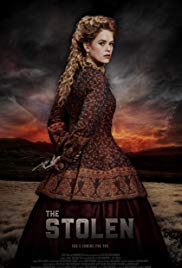
THE STOLEN
New Zealand/Emirates/UK, 2017, 91 minutes, Colour.
Alice Eve, Jack Davenport, Richard O' Brien, Emily Corcoran.
Directed by Niall Johnson.
The Stolen is set on the South Island of New Zealand in the 1880s. The plot and its development a parallel to what can be seen in quite a number of American westerns.
One of the strengths of the film is the beauty of its settings, farm and mansion initially, travelling the countryside, the small towns, going into the rugged mountains, the coast and beach finale.
The stolen of the title is a little baby. The mother is Charlotte, played by Alice Eve who has to move from British gentility to a resourceful survivor. When the baby is abducted and her husband killed, she receives a blackmail letter for hostage money, decides to go on a quest, the difficulties of the rugged countryside, the small towns and her genteel experience, being robbed, going to the remote gold settlement with a group of prostitutes, their looking down on her, her having to join in their performance in the gold town, encountering the mastermind of the new town, Jack Davenport, who had organised the abduction of the baby and was jealous of the success of her husband.
The film becomes more melodramatic as it proceeds, Charlotte propositioned by the mastermind, getting help from the prostitutes, being helped by the Maori guide of the expedition, and a final confrontation of the at the beach and Charlotte drawing on her target practice defeating the mastermind.
Rocky Horror’s Richard O’ Brien appears as the manager of the bar, sly and insinuating, momentarily sympathetic.
Interesting to watch, a picture of 19th century frontier life.
1. A New Zealand story? Like a Western? Frontiers in the 1880s?
2. New Zealand history, Colony, the Maoris, the new owners, the British and their ambitions? Gold, frontier towns, law and order, exploitation?
3. The settings, the South Island, the farm and the mansion, the countryside, travelling through the countryside, the towns, rough, the saloons? The rugged mountains, Goldtown? The beach and the coast? The musical score?
4. Charlotte, her place in New Zealand, from London, her pregnancy, love for her husband, expectations of her settling down? The crops, the maids? Giving birth, her hopes? The shock of the abduction, the masked men, the death of her husband? And with her maid, sacking her?
5. The transition from a genteel lady to a resourceful woman? The letter, the blackmail? The quest, travelling, the bank, going to the town, dressing elegantly, the other women, the information about Goldtown, arrangements for travel, the agreement, the accommodation, being robbed?
6. The drivers? The men, the prostitute passengers, their characters, talk, their work, their personal stories, the treatment? The accident and trying to lift the wagon?
7. The arrival in Goldtown, the bar and saloon, the customers, the man in the bar, the fat client and his wanting Charlotte? Her changing her clothing, surviving in this context? Getting information, the search for her child, the photo, the interrogations?
8. Charlotte and guns, awkward, the target practice and her ultimate skill?
9. The boss of the town, coming from England, his story, jealousy of her husband, his treatment of her, her reaction? His motivations, building and empire?
10. The information about the baby, seeing it, getting help, the women helping, the attacks?
11. Charlotte, getting away, the married guide and his help? The rugged journey with the baby?
12. The beach sequence, the death of the Marie, the confrontation, the guns, her past and shooting practice, her killing the landowner?
13. Her future? The baby? New Zealand origins?
14. A portrait of frontiers and frontier towns, 19th century?
Published in Movie Reviews
Published in
Movie Reviews
Saturday, 09 October 2021 13:00
Good Boys
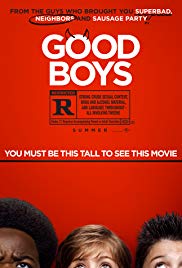
GOOD BOYS
US, 2019, 90 minutes, Colour.
Jacob Tremblay, Keith L.Williams, Brady Noon, Molly Gordon, Midori Francis, Izaac Wang, Millie Davis, Will Forte, Stephen Merchant.
Directed by Gene Stupnitzky.
With a title like that, it is a fair guess to say that the boys of the title will not be good. In fact, they would like to be, at least for their age, moving towards super bad!
The three boys are 11, moving towards 12, in their last year at Junior School. There is Max, rather diminutive, played by Jacob Tremblay who was so good in Room and Wonder. There is Lucas, a large and tall African-American? friend (Keith L.Williams). And there is Thor, a bit full of himself but also quite insecure, rather hard to like, (Brady Noon).
There is a great deal of innocence about these boys which they are not quite aware of, except, perhaps, for Lucas who has absorbed a great number of principles and is prone to speak out the truth even if the occasion is very awkward for his friends. But, of course, a lot of innocence is based on ignorance and, combined with naivete, the boys want to be bad, at least their interpretation of bad. They can swear a lot – and they do. They aware of sex, drugs, alcohol – but, how extraordinarily ignorantly innocent on all these topics.
Of course, there are others around who have transcended innocence and ignorance and lead the good boys into an unwitting temptation.
However, during the course of the day, Max is persuaded to take his father’s drone, prized by his father and not allowed to be touched, especially by Max, and disaster ensues. So, everything that could go wrong, does go wrong – and, Max is persuaded to go on with his quest to recover the drone so that he can get to a party which is described as a kissing party because a young girl will be there and he has his eye on her (well, not exactly because he is continually looking away, awkwardly) and he would love to kiss her.
So, the film is a blend of adventures and accidents, ignorance and naivete, rudeness and innocence, facing parents, an issue of divorce, the boys having to try to do drug deals, stand-offs with teenage girls, and trying to get the drone back to its place in the house (which as it turns out, destructively).
But, we hope that these boys will learn from their misadventures and a certain innate goodness will emerge. Seth Rogan is one of those involved in production (memories of Superbad and his other raucous comedies), and the film has a trailer where Rogan is interviewing the three boys to explain to them that the classification means, especially because of the swearing, they would not be admitted to see their own film.
So, a comic mixture of ignorance and innocence, with added naivete.
1. The title and tone? Expectations? The young cast?
2. The American city, homes and streets, drugs, parties, the highways? The supermarket? The musical score?
3. The boys and their age, the last year of junior school, their attitude, wanting to be bad, showing off?
4. Issues of ignorance and innocence? Naivete?
5. Each boy and his family, Max and his father, the use of the drone? Thor and his mother and sister? Lucas and his benign parents and the discussions about the divorce?
6. The day of action? The boys, the bullying and taunts, the beer drinking…? The senior girls? The peer expectations?
7. The drone, taking it, the search, the use, the crash? Wanting to buy a new one? The issue of money? The quest? The girls, the drugs? The money? The interactions with the girls and the pursuit?
8. The girls, the characters, the drugs, their friends, driving, the boys on bikes? The girls tricking them?
9. The boys, the episode with the dealers, the adult dealers, the effect?
10. The life-sized doll? The comic section with Stephen Merchant and the bargaining? The boys and the difficulties of crossing the freeway, the crash and destroying the doll?
11. Max, his age, short, wanting to kiss the girl, not game to look at her? The advice from his friend? The kissing party as the goal for the day?
12. Thor, his ability to sing, the boys slinging off at him, his backing down, denial? His obnoxious behaviour?
13. Lucas, more genial, his principles, blurting out the truth?
14. The mixture of badness and ignorance? The issues of pornography, the making of babies, drugs, drinking beer and sips?
15. Going home, getting the drone, its smashing the house, Max’s father’s reaction? His getting out for the party, not telling anyone about Thor? Lucas and his help? The spin the bottle, the kiss? The boys having to grow up, the beanbag group, moving into more mature friendships, accepting changes?
16. Max, his range of girlfriends, Thor and his ability to sing and the approval of his teacher, Lucas and his joining the squad to protect victims?
Published in Movie Reviews
Published in
Movie Reviews
Saturday, 09 October 2021 13:00
Abominable
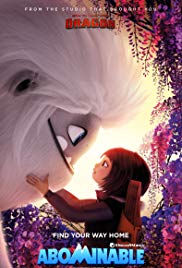
ABOMINABLE
US/China, 2019, 97 minutes, Colour.
Chloe Bennett, Albert Tsai, Tenzing Norgate Trainor, Sarah Paulson, Eddie Izzard, Tsai Chin, James Hong.
Directed by Jill Culton.
It’s always a risk giving a word that has negative overtones to the title of a film. One hopes that the immediate thought of any parent contemplating taking their children to see this film is, of course, the Yeti, and the overtones of the Abominable Snowman. And a reassurance, the yeti is by no means abominable, in fact turns out to be a baby Yeti, soft and cuddly, big animated eyes, bottom buck teeth, a big toy.
While the film is produced by DreamWorks?, it is a collaboration with China, especially studios in Shanghai. The initial setting is the city of Shanghai and all the characters, except the villainous characters, are all Chinese. The principal villain, a wealthy entrepreneur who wants to exhibit the Yeti (voiced by Eddie Izzard) and an expert he calls in (and who is inwardly villainous) who is voiced by Sarah Paulson.
This is the story of a young girl, Yi (voiced by Chloe Bennett) and audiences are invited to identify with her. She lives at home with her mother and grandmother, misses her father who has died, but has encouraged her to play the violin and keeps a photo of herself with her father in her violin case. We see her going out to do a huge range of odd jobs, earning some money so that she can go and visit all the places that her father travelled to and from where he sent her postcards.
At the opening, the yeti escapes, seeing a poster for travel to Mount Everest – and when Yi finds him on her rooftop, and sees the poster, she calls him Everest.
Basically, Abominable is a rescue story and taking Everest home. But it is also a travel adventure, with Yi joined by a rather insufferable teenage boy, Jin (Tenzing Norgate Trainer), completely modern, can’t live without his phone, but completely narcissistic. And then, there is the chubby playful young neighbour, Pang (Albert Tsai) who loves basketball, wants Everest to join in, all very cuddly.
They are continually trying to evade capture by Mr Burnish and Dr Zara. They travel by boat, travel by truck (full of the local Cola proving more than temptation to Everest and Pang), by car, by foot, up rivers, through jungles, over the Yellow Mountains, into the foothills of the Himalayas.
Which means that there is quite an amount of action, mild enough for the young audience, a sense of menace and danger for the travellers, some precarious situations.
And, there is violin playing and Everest displaying a great gift of humming – which leads to some magical situations (including a giant blueberry pursuit), and Everest able to change shape.
There is a surprise conversion towards the end of the film, and a forceful message that creatures should be allowed to remain in their natural habitat rather than be rounded up, imprisoned, trophies for human vanity.
On the whole, Abominable is definitely not abominable but is rather sweet.
1. An animation feature for the family? The heroics central character – and young girls identifying with her?
2. An American- Chinese production, the Shanghai setting is, travelling through China to the Himalayas? The Chinese characters, the family, the friends? The non-Chinese being the villain is?
3. The title, the attraction of the Yeti, cuddly, escaping from Mr Burnish, Dr Zara and her pursuit, the police, the helicopters? The yeti and the poster for visiting Everest? The little girl giving the yeti that name? Her hiding him on the roof? Wanting to save him, to take him back to the Himalayas?
4. Yi, her age, character, her absent father, his teaching of the violin, the photo in the violin case, her playing and the response of Everest? Her mother and grandmother, concerned? For doing the job is to save the money? The decision to save Everest?
5. The children in the area, Pang and his love for basketball, responding to Everest and playing? Jin, the friends, ignoring Yi, his phone and selfies, narcissistic? The irony of the three involved in the adventure?
6. The pursuit, the various escapes, jumping on the boat, landing, the truck and the Cola, in the jungle, Everest and the capacity for magic, the food, the pursuit by the blueberries? The various people helping, driving? The bridge, getting to the Himalayas?
7. Mr Burnish, the entrepreneur, wanting to capture the Yeti? Dr Zara and her squad? The irony of Mr Burnish changing his attitude, supporting the Yeti, Dr Zara becoming the villain and intense on her pursuit?
8. The touches of magic, Everest and his humming, the postcards and all the places her father had visited and her having seen them all? The stone Buddha at the river?
9. Everest, the appearance of his parents, his being restored? Mr Burnish happy, Dr Zara defeated, and the happy return home?
Published in Movie Reviews
Published in
Movie Reviews
Saturday, 09 October 2021 13:00
Miss Meadows
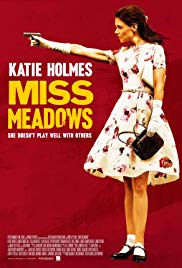
MISS MEADOWS
US, 2014, 88 minutes, Colour.
Katie Holmes, James Badge Dale, Callan Mulvey, Jean Smart, Mary Kay Place, Ava Kolker, Stephen Bishop, James Keane.
Directed by Karen Leigh Hopkins.
Miss Meadows is a brief black comedy. Katie Holmes, who served as an executive producer, his chirpy and breezy as Miss Meadows, seen walking along a suburban Street, reading poetry, prim in her outfit, doing skips and dances. She is a very proper young woman. A passing truck driver makes unwelcome advances, draws a gun – and she shoots him, putting her go back in her handbag, adjusting herself and continuing on her way.
Clearly this is going to be a black comedy. And, this is reinforced throughout the film with Miss Meadows giving her a very strong vigilantes views about eliminating criminals, are going to a diner and finding a massacre and taunting the killer and shooting him. She also encounters a sexually abusive priest and, as he declares his doing God’s work, she shoots him also. And there is a climax with the recently released prisoner whom she had confronted and who abducts the little girl from the kindergarten class that she teaches and who admires her and wants to be like her. Miss Meadows runs for the church and her wedding ceremony to rescue the little girl, saved by the sheriff who shoots him.
The sheriff is a genial man, played by James Badge Dale, immediately attracted to her, taking her out, going to church with her, the sexual encounter, a proposal, her pregnancy, and his leaving the church to save her. He explains that the killer’s prints and her gun and so all will be well.
The film was written and directed by Karen Leigh Hopkins, keeping the tone between prim respectability and the vigilante behaviour and principles. There is an interesting supporting role from Jean Smart as Miss Meadows mother – who is finally revealed as a memory in her daughter’s troubled psyche.
1. The title? Room? The film’s emphasis on good manners? But the underlying black humour?
2. The Ohio town, the streets, the suburban houses and gardens, the school, the police precinct, the countryside and the sea, the church and ceremonies? The musical score? Jaunty and good mannered? The atmosphere and too-da-loo?
3. Katie Holmes as Miss Meadows, age, prim, her dresses and outfits, good manners, chats with the neighbours about gardens as well as security grills? Teaching at the school, her presence with children, the classes, the activities, making friends with Ruth and Ruth’s admiration? The discussions about death, angels in heaven? The reclusive boy and her concern? The encounter with the sheriff, parking the car on the bridge, saving the toad?
4. Audience response to the lascivious man in the van, his gross invitations, his gun, her shooting him, putting the gun back in her purse? Continuing on the street and a little dance?
5. Miss Meadows and her phone calls to her mother, the personality of the mother, praising her daughter, protecting her daughter, suspicious of men? Miss Meadows ringing about the sheriff, her pregnancy, the marriage? The flashbacks to the ceremony, black-and-white, the little girl, her mother and the dress, the drive-by shooting? And the revelation that her mother was a figment of her imagination?
6. Miss Meadows as a vigilante, her theories about justice, the impact of the memories of her past, speaking frankly about villains, those released from prison and living in the town, explaining her theories to the sheriff? The episode of going to buy hotdogs for the children, the massacre in the shop, the confrontation with the perpetrator, his putting the gun in his mouth and her advice, her shooting him? The later revelation that Ruth had seen her? Yet Ruth devoted to her, wanting to be like her, infiltrating the house, getting into the bed?
7. The sheriff, his personality, first meeting on the bridge, the attraction, his coming to the house, the going out, the conversations, seeing her in the church, her singing in the choir, not being Catholic, his being a recovering Catholic? The dates, the outings, his puzzle about attitudes? His work with his fellow officer and solving the crimes? The sexual experience, the effect? His proposal, the acceptance, her pregnancy and going to the doctor, her telling the sheriff?
8. The suspicious man released from prison, his dog, taunting Miss Meadows, her going to see him, the gift, the talking straight, his saying he had reformed? His resentment against her?
9. The reclusive boy, in class, hurrying to the priest, her coming after him, the priest and the sexual abuse, his declaring that he was doing God’s work, her shooting him?
10. The wedding, the sheriff at the altar, her being late, Ruth and her disappearance, her hurrying to see the criminal, his taunting her, the gun, his taking her gun, the sheriff in pursuit, shooting him?
11. The sheriff knowing the truth, willing to do anything for her, the criminal’s prints and the gun, and not being a suspect?
12. His wanting to play the accordion, the domestic scene, mother and baby, her going out, primly walking, her outfit, going on her vigilante mission?
13. How well did the sympathy for Miss Meadows mix with audience attitudes towards her carefree vigilante attitudes and behaviour?
Published in Movie Reviews
Published in
Movie Reviews
Saturday, 09 October 2021 13:00
Ad Astra
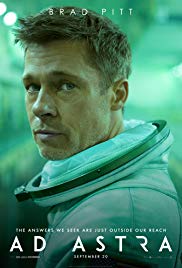
AD ASTRA
US, 2019, 123 minutes, Colour.
Brad Pitt, Tommy Lee Jones, Ruth Negga, Donald Sutherland, Kimberly Elise, Loren Dean, Donnie Keshawarz, Sean Blackmore, Bobby Nish, Lisa Gay Hamilton, John Ortiz.
Directed by James Gray.
Ad Astra is an air force motto which means going to the stars. In this film, it also has the meaning of looking at and looking towards the stars.
Perhaps the Latin title is a warning that this is not exactly a space action show. Well there is some action, but this is more the 21st-century space Odyssey rather than Trek. The space developments during the 20th century were extraordinary, from Sputniks to dogs in space, to astronauts, to the landing on the moon, subsequent journeys into space, the establishment of space stations… The 21st-century benefits from all of this. It still means that a Space Odyssey in this century means going beyond the moon, even to beyond Mars, to establishing settlements in space (and by the time of the ‘near future’ setting of Ad Astra, we see escalators, space ports, even Subway on the moon). And, there is always the question, are there other intelligent beings out there in the vastness of the universe.
The hero of this story, this 21st-century Odysseus/Ulysses, is a very ordinary citizen, with a very ordinary name, Roy Mc Bride. His main privilege in life is that he is the son of the most celebrated astronaut, Cliff Mc Bride, who had been sent out into deep space to search for intelligence. As the film opens, he has not returned, government officials are concerned about him as well as the Lima Project.
Roy is played by Brad Pitt, a suitable choice for a 21st century Everyman. We see him at work, on a space station, experiencing extraordinary surges and his spectacular fall from the tower. He recovers but the authorities seeking out, urging him to go on a mission to find his father (who is seen later, played by Tommy Lee Jones). Everything is top-secret, a commercial trip to the moon, then a space ship to Mars, a mission to try to contact his father, a spaceship beyond Mars towards Neptune.
Initially, Roy is accompanied by a fellow-worker and friend of his father, played by Donald Sutherland. But, he falls ill on the moon, and Roy has to go on alone.
Interestingly, in comparison with Kubrick’s Odyssey, and the hostility of the computer, HAL, technology is not the enemy. But, technology abused, can be destructive, is destructive.
A reviewer described Ad Astra as a cerebral space Odyssey. In fact, it is. It is an existential space Odyssey, with enough contemplation, reflection and articulation about what it is to be human, what it is to be an explorer in space, how much solitude is needed to travel in space, what is destiny in terms of space exploration, and what is fate. And, there is always the question, here dramatised in a father-son relationship and conflict, how much is destiny and how much is hubris. And, if hubris, how much disaster and destruction?
For Odysseus, after his achievement in the Trojan War, his wandering the seas was to bring him back home. So, how much value is there in the space Odysseys – and how much should we as humans be valuing life, love, and home.
1. The title, looking to the stars, going to the stars?
2. 21st-century space Odyssey, the 20th century and the explorations of space, landing on the moon? 21st-century technology, questions and issues, goals, intelligent life in space? Moments in space?
3. The moments on Earth, Roy, his relationship, preparing to leave, the mission? His going home, the landing on earth and the rescue?
4. The setting in the near future, very much like the present? The opening up of space, the explorations and search, intelligent life, not found as yet? The transitions on the moon, taking the comforts of birth into space? The technology and the centres on the moon? On Mars? Predictions for the future?
5. Brad Pitt as Roy Mc Bride, a 21st-century Everyman? His relationship with his father, his father’s work ethic, work then play, issues of success and failure? Roy and his relationship with his father, his father’s severity, and ignoring him? The relationship with Eva? Her leaving? Admiring his father, remembering him, the sense of abandonment, his choice of career, dedication, but introverted, liking solitude, driven by sense of duty?
6. Cliff Mc Bride, Tommy Lee Jones, Mc Bride’s reputation, set up as an ideal, his portrait, the Lima Project? The achievement, going beyond Mars, his disappearance? Government attitudes, fear of him, that he was still alive, wanting his return? The Project to be stopped?
7. The experience of the surges, Roy and his work on the tower, the fires, his collapse and fall? Surges around the world? The effect, the consequences?
8. Roy, socialising but preferring solitude, to find the exit? His voice-over, moods, the report, his insights and decisions?
9. Roy and his choices, surviving the fall, the authorities and their information, request, top-secret, the range of psychological tests and the recurring? Roy’s calm, phlegmatic, preparing for the mission?
10. Meeting Pruitt, the history of Pruitt and his father, their friendship, studies together? Work in space? Pruitt with Roy, their talking, the preparation, travelling to the moon, commercial travelling, Pruitt and his illness, withdrawing from the project?
11. Roy, going to the moon, the crew, the secrecy, the moon and escalators, Subway? The contacts?
12. The preparation to go to Mars, the crew, the secrecy, the May Day experience, Roy warning against it, the deaths? The captain, his fear in landing? Roy taking over?
13. Helena, on Mars, born there, her authority, responsibilities? The levels of authority? The scenes of recording the message to be sent to Cliff? No response? Roy’s reaction? The further mission?
14. The drive, the terrain of Mars, sunsets, Helena helping? Getting on board, the deaths of the crew, Roy’s decision, continuing the mission, giving information and then silence?
15. The range of hazards, the effect of the journey, to Neptune?
16. His arrival, meeting Cliff, the discussions, father-son relationship? Cliff and his hubris? Roy pleading with him? Cliff and his achievement, wanting to continue? His death? Roy, going to the ship, the information, recording it? The shield against the space debris? His return to the ship, return to Earth?
17. Returning to earth, his memories, glimpses of Eva, his choices for living, for loving, going home?
18. The space Odyssey, the nature of space, explorations, the existential questions about human nature, pride and destiny, intervention of fate?
Published in Movie Reviews
Published in
Movie Reviews
Saturday, 09 October 2021 13:00
Dora and the Lost City of Gold
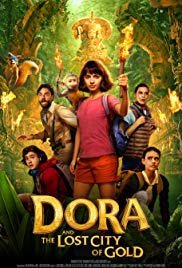
DORA AND THE LOST CITY OF GOLD
US, 2019, 102 minutes, Colour.
Isabel Moner, Jeffrey Wahlberg, Nicholas Coombe, Madeieine Madden, Eugene Deberz, Eva Longoria, Michael Peña, Adriana Barazza, Temuera Morrison. Voices of: Benicio del Toro, Danny Trejo.
Directed by James Bobin.
it probably depends upon how old you are. Adult audiences may well remember Dora comics and stories, Nickelodeon cartoons from the past decades and have a soft spot for Dora and all her adventures. Younger audiences, although teenagers may identify with the characters, may enjoy accompanying Dora in her adventures, as little girl in Peru, as a teenager at school in the US, but, principally and more dangerously, back in the jungle.
The filmmakers and writers have had a career in making films about teenagers, some raucous comedies, work with the Muppets. They gear their screenplay to the younger audiences, some repartee, some very corny lines, some obvious adventures and dangers – with some magic stirred in.
The film shows its cartoon and animation origins – at one stage, the characters reverting from their human shapes to their cartoon form. And, there is a villainous swiping Fox (voiced by Benicio del Toro), a genial talking bird (Boots voiced by Danny Trejo), and a backpack which also talks.
One of the ways of appreciating what is happening on the screen and the characters and their performances is to think of a cinema equivalent of pantomime. Dora is the enthusiastic exuberant heroine, the indomitable type. Her three teenage companions, including her cousin Diego, are more stereotypical, the bossy girl transported to the jungle and losing her cool, the dork type who puts his foot in it although he has learned number of lessons from playing computer games, and the cousin who is meant to be the Prince Charming (although very stolid in his screen presence and performance).
Dora’s parents are explorers and there are some villains (think pantomime) who abduct Dora and, by accident, her companions, fly them to Peru so that they can follow her and find her parents, round everyone up and go to the secret sauce of gold and treasure.
And, more or less, this is what happens although there are all kinds of comic adventures on the way, and something of a twist when they learn the identity of the rather gawkish Professor who rescues them at the airport.
And, of course, the last part of the adventure, in an ancient temple with all kinds of doors, gates and traps, watercourses and sluices, statues and treasure, all very much in the Indiana Jones vein.
A lot of the film was actually shot in Queensland.
The appeal is directly to the younger audience rather than the adults who accompany them – but, if they think pantomime, pantomime heroine, pantomime comics, pantomime villains, they might share something of the enjoyment of the children.
1. Dora and her Nickelodeon appearances, her following? Live-action – pantomime style?
2. The popularity with audiences, older audiences, the newer, younger audiences?
3. The adaptation to live action, the cast, the style, the action sequences, the dialogue? Musical score?
4. The characters, younger audiences identifying with them? Dora and her heroic status?
5. Dora young, the action sequences, her relationship with her parents, the background of the Incas and exploring, Diego’s presence, the bond between them?
6. 10 years passing, high school, Dora exuberant, Diego stolid, Sammy and the clashes, Dora upset?
7. The visit to the museum, the quest, the helper offering information, the group, going to the basement, hiding, all abducted? The plane ride, Peru?
8. The professor, his style, rescuing the group, his story, wanting to meet the parents, driving them, his help?
9. The villains, the guide in the Museum, the leader and associates? Comic villains? The pursuit?
10. Adventures in the jungle, pursuit, the quicksand, the scorpions, the personal clashes, here’s? Sammy and the toilet break?
11. The transition to the characters as cartoons, the effect? Boots, talking, the talking backpack?
12. The character of the Fox, Swipe, interventions? Cheeky? Boots, friendship, talking, rescues?
13. The parents, their quest, the group finding their camp, abandoned?
14. The old Opera house, the water, the sluices?
15. The old lady, her appearance, the options, the choices?
16. Sammy, her character, snobbish, wanting a mod cons, changing attitudes? Randy, gawkish, computer games, solving some of the problems? Diego, attracted to Sammy, denying it, rather stolid?
17. The temple, the Indiana Jones memories, the traps, the Gold, the the this, the jump? The priestess, her appearance, the guards?
18. The professor, his greed, betrayal, with the Gold, his four?
19. Dora, the choices, with her parents exploring all going back to school, the High School Musical ending?
Published in Movie Reviews
Published in
Movie Reviews
Saturday, 09 October 2021 13:00
Extremely Wicked, Shockingly Evil, Vile

EXTREMELY WICKED, SHOCKINGLY EVIL AND VILE
US, 2019, 110 minutes, Colour.
Zac Efron, Lily Collins, Kaya Scodelario, John Malkovich, Haley Joel Osment, Jeffrey Donovan, Terry Kinney, Jim Parsons.
Directed by Joe Berlinger.
The title is certainly arresting. It looks and sounds like something that a press agent would concoct to attract an audience which may be looking for something sensational, or sensationalist. In fact, it is part of the speech by the presiding judge in his sentencing mass murderer, Ted Bundy, to the electric chair.
Ted Bundy has emerged as one of America’s most savage killers. He began his violence during the 1960s and this continued during the 1970s. He was executed in January 1989.
While the theme of the film is somewhat sensationalist, the treatment is much more measured. The screenplay is based on a memoir by Bundy’s girlfriend, Liz Kendall, who could not believe that Bundy could wreak so much violence, was in denial about what he did – although, she felt guilty over many years because of the fact that seeing an artist’s sketch of a man allegedly attacking women and its reminding her of him, gave his name to the police.
The audience knows right at the opening of the film that Bundy is in prison. Liz visits him – and, as we finally see, this is her final visit to him to ask him to confess.
Which means then that characters and events are seen in flashback. From the outset, we see, as Liz does, that Bundy is a man of great personal charm, with the ability to sweep women off their feet, his knowing the right things to say, the right things to do. He wins Liz over instantly, accepting the fact that she is a single mother, acting in a fatherly way to her young daughter, a match seemingly made in heaven. The screenplay is prudent and not revealing so much detail, let alone visualising the crimes, until an hour of the film has passed. In fact, those seeking sensationalism, will be quite disappointed as any graphic images of violence are kept until the end.
Although we know that Bundy gets into trouble with the police, being pulled over for traffic problems, on the police radar, moving around from Utah to Colorado and to the north-west, we tend to see him from Liz’s point of view. He is studying law – which means then that is quite knowledgeable, can defend himself (and often does), can pick up nuances in the law and get himself out of trouble. But, increasingly, he does not get himself out of trouble, is imprisoned, studies for his defence, opportunities to escape from prison, and he does.
As we realise by his final confession, he is in complete self-denial, a different image of himself, protesting that the court and media images of the killer is the complete opposite of himself.
Over the years, Liz finds his contacts and calls too much to bear. She is visited by various detectives and police officials from the different states. In the meantime, an earlier friend of Bundy’s, Carole Anne Boone (Kaya Scodelario) believes in him utterly, even his pulling a stunt during his final trial in proposing to her as she is in the witness box, legally marrying her like this according to Florida law.
Much of the transcript of his final trial is incorporated into the screenplay here. John Malkovich is the judge, an intriguing performance, giving Bundy enough rope to… Then turning the tables on him. His final address to Bundy, summarising his personality and his performance while telling him to take care, also announces that he is extremely wicked, shockingly evil, vile.
His trials tend to be media circuses, television being allowed into film the final trial. And, there is the extraordinary response of women who come to the trial, give interviews about how attractive he is, some saying they are in love with him.
The director is Joe Berlinger, a veteran of many years documentary filmmaking and television making, who has also produced a television series on Bundy.
However, much of the success of the film lies with Zac Efron, quite a long way from his enthusiastic youngster in the High School Musical series. At first, it is difficult to recognise Zac Efron with his different hairstyle, sometimes moustache, sometimes beard. Which means then that he has created a character independent of his past screen image. He knows how to exude charm. He certainly knows how to dramatise a kind of self-pitying proclaiming of innocence. We see him as two-timing but, only at the end, his brutality. We still wonder about his psychopathic mental condition.
During the final credits there are sequences showing the central characters, Liz and Carole Anne Boone, detectives and the actual judge himself.
And, starkly in black-and-white, an overwhelming list of the women who were his victims.
1. The title? The final judgement on Ted Bundy by the presiding judge?
2. Ted Bundy and his reputation, serial killer of the 1970s into the 1980s? His crimes? His appearance, charm? His denials? As a young lawyer, his self-defence?
3. Audiences knowing the facts about his case? This film’s director and his four-part documentary series with interviews? The portrait of Bundy himself, the role of the police and the detectives, his being under suspicion, his studying the law, his exercising the law, his performances in court, imprisonment, his self-vindication during the 1980s? His execution?
4. Zac Efron cast as Ted Bundy, his appearance, impersonation, communicating the character of Bundy to a puzzled audience?
5. The audience knowing that Bundy was guilty, learning about him, puzzled by him, the filmmaking, his character and behaviour more comprehensible?
6. Liz, her final visit, wanting him to confess? The reprise of this visit at the end? Liz and her relationship with Bundy in the flashbacks, Liz a character in herself, her daughter, the diner, his charm at the bar, the dance, attractive? The relationship? Her belief in him? His role in the house, father, with the daughter? Liz and her work, the range of friends, their being more suspicious initially than she? Her defending him? His first being under suspicion, the missing girls? The sketch and description, the later revelation that she had informed the police about him? His continued reassurance, re-appearances? Their not marrying? Her growing more disillusioned, his being in the court in prison, the phone calls, the keeping a distance, the friendship and support of Jerry? Her eventually cutting him off? Presence in the court? Going to visit him, asking him to confess?
7. Bundy, his background, the later scene of his mother in court? His studies, on the campus, the law? His study, his personal vanity and charm? Travel, being the locations of the crimes?
8. The reports of girls missing, increasing number of deaths, the public apprehensive? His connection with the various places, his car, held up by the police and his plausible alibi? His always being plausible?
9. The detectives, the visits and interviews, the police? Local, interstate, the discussions about him? Media reports about the deaths? His being arrested, charged, in court, the lawyers, his behaviour, excuses? Being released?
10. Mary Kay Boone, the friendship in the past, coming to the court, continued support, devotion, in love with him, her being willing to be a witness, his exploitation of her, sexually, the proposal in the court, her pregnancy?
11. The range of charges, Bundy and his successful warding them off? The accumulation of evidence, the range of lawyers, his own belief in his skills, grandstanding?
12. The final arrest, the police and the detectives, the enquiry, the evidence?
13. In court, the personality of the judge and his presiding, his attitudes, allowing the media in? Bundy capitalising on the situation? Performance, finance? The judge giving him
enough rope – but reining him in, the judge’s reactions? The jury, the decisions, his being guilty? The judge delivering his judgements and a certain concern about Bundy as a person?
14. Liz and her visit? Admitting the truth? The background of the director and his making the documentary portrait of Bundy, life, studies, reserve, with women, anger unleashed? His execution?
15. The rise of serial killers in the United States, the 60s and 70s? The place of Bundy within this killers’ gallery?
Published in Movie Reviews
Published in
Movie Reviews